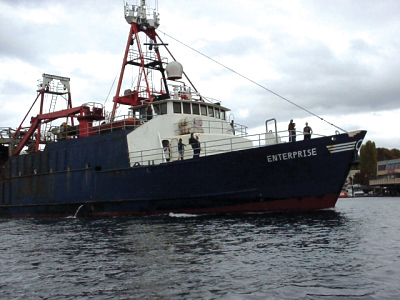By James Tabafunda
Northwest Asian Weekly
 Vinh Phan died on June 3, 2007, in Alaska while working aboard the F/T Enterprise, a factory trawler of the O'Hara Corporation. Phan was hosing fish out of a holding tank when a hydraulic door was activated, crushing his head. On Sept. 21, the company admitted liability. Phan's parents will receive $522,362.50. (Photo from oharacorporation.com) |
Vinh Phan will never again walk through the front door of the Olympia home he shares with his parents.
He died on June 3, 2007, in Alaska while working aboard the F/T Enterprise, a factory trawler. According to a U.S. Coast Guard report, he was hosing fish out of a holding tank when a hydraulic door was activated, crushing his head. His parents and four siblings agreed that there was only one thing they had to do: tell their story to a judge.
“We strongly believe that the American judicial system is meant to bring out the truths and through the truths that justice and fairness shall prevail,” explained Ken Phan, Vinh’s younger brother.
“[A lawsuit was] their only recourse, and of course, it’s no substitute for their son, but it was the one thing they could do to honor him,” said Corrie Yackulic, the family’s lawyer.
In February 2009, Ken Phan, their second oldest son, served as a personal representative of his deceased brother’s estate and filed a civil lawsuit against O’Hara Corporation, owner and operator of the F/T Enterprise.
On Sept. 21, the company admitted liability, and King County Superior Court Judge Steven Gonzalez ruled in favor of Phan’s parents. “Bang Phan and Tron Bui are proper statutory beneficiaries under the Death on the High Seas Act … in the amount of $522,362.50,” wrote Gonzalez, in his final statement.
There will be no appeal.
“It will help them get their financial affairs in order because he was an important contributor to the family finances. … It’s given them some breathing room,” Yackulic said. Like other Asian cultures, the Vietnamese culture expects the oldest son in the family to ensure that his parents are financially supported and that they live with him at his own house. He (Phan) always understood his responsibility.”
“[Judge Gonzalez] did find that Vinh would have supported his parents to the end of their lives,” she said. “If he hadn’t found that, the damages would have been zero, and that’s what the other side argued.”
“I think over his lifetime, he was definitely going to support his parents,” said Yackulic. “The only issue in the case was the measure of their loss. The only witnesses that could communicate that were the family.”
Yackulic says that this issue comprises both the loss of financial support to Phan’s parents and the loss of household support [past and future] by Phan himself, including such responsibilities as grocery shopping.
The Phan family
Phan was born on February 21, 1979, in Vietnam. Bang Phan, his father, served as a lieutenant in the South Vietnamese army during the Vietnam War. Vinh Phan immigrated to the United States with his parents, sisters, Hannah Truong, Kim Phan, and Kaylie Phan, and brother Ken Phan under a law that allowed immigration to former South Vietnamese servicemen and their families.
After the fall of Saigon in April 1975, Bang Phan took his family to Cambodia and then to Thailand, where they lived in a refugee camp waiting to receive refugee status and a sponsor for immigration to the United States.
Vinh Phan was 14 years old when he arrived in the United States in 1993. He attended Black Hills High School and, at the age of 20 in 1999, graduated 63rd out of his class of 133.
Phan practiced his parents’ religion, Buddhism. According to Yackulic, his younger siblings are not Buddhist. “It was, again, evidence of his commitment to the cultural traditions of his family,” she said.
Another example of Vinh’s commitment to his family’s cultural traditions was his trip to Vietnam to marry Thuy Kim Tran. Because the couple later filed for divorce in December 2006, Judge Gonzalez concluded that their marriage was “defunct at the time of his death.”
Ken Phan said about his deceased brother’s commitment, “He was mature enough to understand and value the experiences, hardships, and sacrifice that my parents made to give us all the opportunities and have the privilege of being Asian Americans.”
After briefly attending but not graduating from Crown College in Tacoma, Vinh Phan soon started his own business selling salal plants. He hired others to package them. “They shipped [the salal] to German and Dutch florists,” Yackulic said about the first few months of the business. It failed in 2005, and in 2006 Vinh began working in Alaska’s fishing industry.
The O’Hara Corporation did not respond with a comment after being contacted.
“Having represented enough parents who’ve lost a child, I don’t think people ever really get closure,” said Yackulic.
“His room is still set aside in their house.” ♦
James Tabafunda can be reached at info@nwasianweekly.com.


